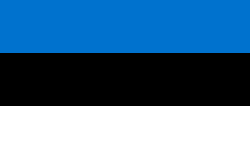Egypt vs Estonia
| 3 – 3 | ||
|---|---|---|
| Abdel Latif Abdel Rahman Hosny | Report | Oper Kristal Viikmäe |
The 2001 season marked the tenth year of competitive football in the Baltic country since its independence. The Estonia national football team played thirteen matches and ranked fourth place overall.
| 3 – 3 | ||
|---|---|---|
| Abdel Latif Abdel Rahman Hosny | Report | Oper Kristal Viikmäe |
| 2 – 4 | ||
|---|---|---|
| Oper Zelinski | Report | Piiroja Van Nistelrooy Kluivert |
| 0 – 2 | ||
|---|---|---|
| Report | Dunne Holland |
| Latvia | 3 – 1 | |
|---|---|---|
| Verpakovskis Pahars Koļesņičenko | Report | Zelinski |
| Lithuania | 5 – 2 | |
|---|---|---|
| Buitkus Česnauskis Vasiliauskas Trakys Vilėniškis | Report | Anniste Švets |
| 5 – 0 | ||
|---|---|---|
| Zenden Van Bommel Cocu Van Nistelrooy | Report |
| 5 – 0 | ||
|---|---|---|
| João Pinto Nuno Gomes Pauleta Luís Figo | Report |
| 0 – 0 | ||
|---|---|---|
| Report |
| Estonia national football team results |
|---|
 |